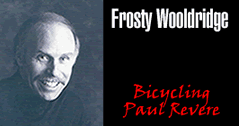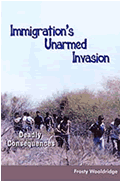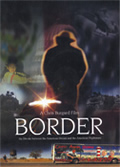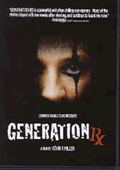CHANGING OUR CULTURE TO THEIR CULTURES
By Frosty
Wooldridge
April 28, 2011
NewsWithViews.com
[Disclaimer: The opinion expressed in this article are solely those of Frosty Wolldridge and not necessary the opinion of NWV, its staff or other writers.]
Over the past 10 years, I have spoken with some of the leading authorities, academics, demographers and experts on the long term consequences of immigration. At no time in the past 40 years has there been any benefits to immigration both legal and illegal. A whopping 100 million people added themselves to our civilization in four decades
Where has it gotten us? Answer: more conflict, more debt, less jobs, lowered standard of living and more problems ever in the history of the United States of America.
I spoke with Bromwell Ault, 81, and director of Center for Public Conscience about his take on what we face as a civilization.
Please give us an idea of our future Mr. Ault:
“Our country and its government are now threatened by a half dozen major issues all of which individually have the power to seriously diminish the quality of life as we know it for our society, and in combination to reduce it to a level of difficulty we refuse to recognize and, therefore, may not be able to endure,” said Ault. “Culture is one of these issues. They have much in common and often overlap in their origins and consequences, and yet we continue to ignore the fact that in varying degrees they are the result of our own action or neglect.
“With our involvement, efforts and choice of direction they would not now be a cause for concern. “Our” in these matters can relate to societal or national scope, and sometimes a combination of both. Critical areas that we will examine in future issues will be our national debt, immigration, population, our environment, religion and economic policy. Key to our understanding of them is how they have developed, how they interrelate in many ways and why they have defied any sensible solution.
“But even with this information in hand, a crucial question of our time and politics must be asked, debated and resolved — In a democratic republic such as ours, how can such vast, societal questions be put to the public? And, of course, more importantly, and in reverse form – how can the American voter best express his/her opinion on these vital topics in the face of our central government’s failure to engage them. Does the individual citizen have the right, or the means, to determine cultural, social, environmental, etc. parameters in our or other nations?
“In 1911 Baron Hardinge, Viceroy of India, convened a Durbar in Delhi that was personally attended by King George V and Queen Mary of England. It was a momentous event for both countries. The Durbar was the occasion of assembly of local rulers whose wealth, status, costume, troops and custom were on full display. King George and Queen Mary sat for hours beneath a canopy to receive and review each leader and his special troops. In one of the week’s defining moments, formations of 50,000 British and Indian soldiers four miles long paid homage to their majesties. The Durbar was a “big do.”
“At the beginning of the twentieth century, it was intended to emphasize Britain’s reach and authority and their importance to India. And to further symbolize this relationship, King George announced the construction of a palace to house the head of British government, the commission for which was assigned to Edwin L. Lutyens, England’s most outstanding architect, who would employ his brilliance and creative mastery of architectural language to reflect the status and powers with which England would maintain its empire in India.
“The Viceroy’s Palace with its surrounding gardens, office, staff quarters, maintenance and service areas was home to about two thousand employees. Its construction took far longer than planned because of the priorities demanded by both World Wars and the Great Depression. Its effective lifetime was approximately 16 years from its completion in 1931 to 1947 when India chose independence. A dream, a way of life, an empire, a culture pronounced by King George V among unrivalled pomp was terminated by a frail native Indian in a loin cloth and shawl. The grandest plan of any culture can be altered suddenly or gradually by human intervention. The Viceroy’s Palace, after Indian independence, became its Prime Minister’s Palace. George V died in 1936. It is doubtful that he could have imagined that less than a decade later England would be without its palace and its dream.
“For our purpose, there are two important points to be noted. The English colonial age and effort imposed its culture firmly and broadly upon India which under Gandhi, in the aftermath of WWII, just as firmly and broadly rejected it. Both of these cultural shifts were the result of human intervention.
“Another example of cultural change brought on by human intervention is the Holocaust. The Jewish culture will never again be the same as it was before the Holocaust because the pain, loss and outrage of this event have been so fully observed, experienced and recorded by Jewish sensitivity that they cannot be dislodged.
The course of a culture can be substantially altered, or even terminated, by human intervention which is mostly determined by political leadership. This realization is necessary to understand much of the world’s social and political conflict.”
What is culture?
“It is an ever changing collection of beliefs, identities, speech, religion, politics, arts, ethnic or racial characteristics, genetics and other human attributes that are found in any group of people, and which the group draws upon, whether consciously or not, to express identity and cohesion,” said Ault. “There’s room for both agreement and argument in this definition, and most cultures would be able to accept it as workable, rather than the reason for a war of survival.
“In our present century on planet Earth, however, such acceptance would be unusual as culture has been assigned a leading role in the continuing political Punch and Judy show that in America dominates our government, media and electoral system. This is a relatively recent development in our, and the world’s, history. It used to be that cultures could coexist with politics. Now, they are often forced to compete. The individual human being that used to be thought of as a political unit is now also a cultural unit possessed of many more dimensions which can, therefore, be more easily manipulated and inflamed.”
| Subscribe to the NewsWithViews Daily News Alerts! |
As America’s founding Christian religions and cultural norms compete against growing Islamic cultural norms and antagonisms such as female genital mutilation, honor killings, arranged marriages and language—all citizens will be swept up into emotional, religious and antagonistic confrontations on multiple levels.
Mr. Ault and I will carry on more interviews to give you an idea of what our nation faces with endless immigration.
You can reach Mr. Bromwell Ault at www.centerforpublicconscience.org
Listen to Frosty Wooldridge on Wednesdays as he interviews top national leaders on his radio show "Connecting the Dots" at www.themicroeffect.com at 6:00 PM Mountain Time. Adjust tuning in to your time zone.
� 2011 Frosty Wooldridge - All Rights Reserved












 Share
This Article
Share
This Article








